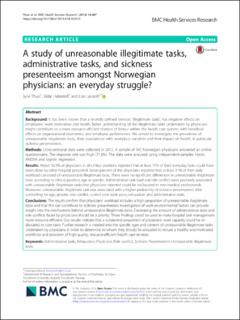| dc.contributor.author | Thun, Sylvi | |
| dc.contributor.author | Halsteinli, Vidar | |
| dc.contributor.author | Løvseth, Lise T | |
| dc.date.accessioned | 2023-01-09T15:18:26Z | |
| dc.date.available | 2023-01-09T15:18:26Z | |
| dc.date.created | 2018-06-08T08:40:37Z | |
| dc.date.issued | 2018 | |
| dc.identifier.citation | BMC Health Services Research. 2018, 18 (407), 1-9. | en_US |
| dc.identifier.issn | 1472-6963 | |
| dc.identifier.uri | https://hdl.handle.net/11250/3042081 | |
| dc.description.abstract | Background - It has been shown that a recently defined stressor, ‘illegitimate tasks’, has negative effects on employees’ work motivation and health. Better understanding of the illegitimate tasks undertaken by physicians might contribute to a more resource-efficient division of labour within the health care system, with beneficial effects on organisational economics and employee performance. We aimed to investigate the prevalence of unreasonable illegitimate tasks, their associations with workplace variables and their impact on health, in particular sickness presenteeism.
Methods - Cross-sectional data were collected in 2012. A sample of 545 Norwegian physicians answered an online questionnaire. The response rate was high (71.8%). The data were analysed using independent-samples t-tests, ANOVA and logistic regression.
Results - About 50.2% of physicians in all clinical positions reported that at least 11% of their everyday tasks could have been done by other hospital personnel. Seven percent of the physicians reported that at least 31% of their daily workload consisted of unreasonable illegitimate tasks. There were no significant differences in unreasonable illegitimate tasks according to clinical position, age or gender. Administrative task load and role conflict were positively associated with unreasonable illegitimate tasks that physicians reported could be reallocated to non-medical professionals. Moreover, unreasonable illegitimate task was associated with a higher probability of sickness presenteeism after controlling for age, gender, role conflict, control over work pace, exhaustion and administrative tasks.
Conclusions - The results confirm that physicians’ workload includes a high proportion of unreasonable illegitimate tasks and that this can contribute to sickness presenteeism. Investigation of work environmental factors can provide insight into the mechanisms behind unreasonable illegitimate tasks. Decreasing the amount of administrative tasks and role conflicts faced by physicians should be a priority. These findings could be used to make hospital task management more resource-efficient. Our results indicate that a substantial proportion of physicians’ work capacity could be re-allocated to core tasks. Further research is needed into the specific type and content of unreasonable illegitimate tasks undertaken by physicians in order to determine to whom they should be allocated to ensure a healthy and motivated workforce and provision of high quality, resource-efficient health care services. | en_US |
| dc.language.iso | eng | en_US |
| dc.publisher | BioMed Central (BMC) | en_US |
| dc.rights | Navngivelse 4.0 Internasjonal | * |
| dc.rights.uri | http://creativecommons.org/licenses/by/4.0/deed.no | * |
| dc.title | A study of unreasonable illegitimate tasks, administrative tasks, and sickness presenteeism amongst Norwegian physicians: an everyday struggle? | en_US |
| dc.type | Peer reviewed | en_US |
| dc.type | Journal article | en_US |
| dc.description.version | publishedVersion | en_US |
| dc.source.pagenumber | 1-9 | en_US |
| dc.source.volume | 18 | en_US |
| dc.source.journal | BMC Health Services Research | en_US |
| dc.source.issue | 407 | en_US |
| dc.identifier.doi | 10.1186/s12913-018-3229-0 | |
| dc.identifier.cristin | 1589874 | |
| cristin.ispublished | true | |
| cristin.fulltext | original | |
| cristin.qualitycode | 2 | |

